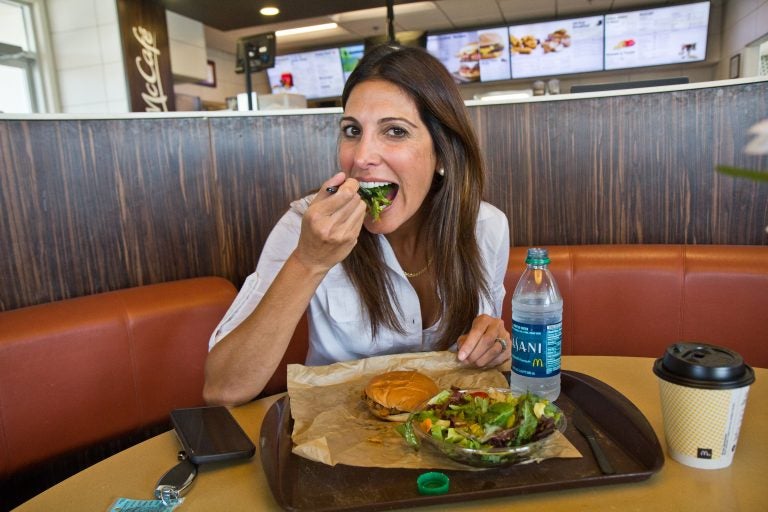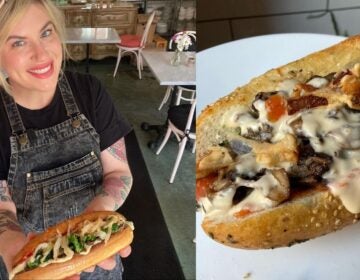To prove a point, Drexel prof goes on monthlong McDonald’s diet
She says the 2004 movie 'Super Size Me' sent the wrong message, and she wants to destigmatize fast food.

Nutritionist Nyree Dardarian ate McDonald's food for three meals a day for a month. (Kimberly Paynter/WHYY)
In the 2004 movie “Super Size Me,” director Morgan Spurlock ate only McDonald’s fare for a month. He ended up gaining a lot of weight, throwing up in a parking lot. It was not pretty.
But an assistant clinical professor of nutrition science at Drexel University felt that didn’t send the right message, so she decided to start her own four-week, McDonald’s-only diet.
Nyree Dardarian recorded everything she ate the month before the diet — and everything she consumed during her fast-food July. Her typical McDonald’s menu consisted of coffee and a parfait in the morning; either a sandwich or a salad for lunch and dinner; and some extra oatmeal or parfait that she brought home for a late-night snack.
She and her husband and three children went on a three-day trip to Boston, but she continued the McDonald’s diet.
“On our way up and back, we all got out, and we all ate at McDonald’s because they all had to accommodate me,” she said. “That was not easy … I ordered a lot at one time, and I kept it with me in the hotel room. We were going out and meeting people for dinner, and I couldn’t participate.”
What Dardarian missed most: bread or a carbohydrate without any meat (she found out some McDonald’s restaurants will let you order a plain bagel with cream cheese) and crunchy food.
“My weakness is Tostitos. So I will probably have about a handful of Tostitos a night, and I missed my Tostitos,” she said. “But I now I realize it’s not the Tostitos, it’s the crunch that I like … there’s nothing crunchy at McDonald’s.”
However, there are some things she didn’t order — and said she will never order — including a double quarter-pounder, because the nutritionist in her said it is a bad idea.
“If someone said, ‘You can have double your paycheck, you’d be pretty happy.’ Well, when it comes to double the fat and red meat portion of your meal, that’s never been something that people say you should double,” she said.
Milkshakes were off limits because they have more calories than a bowl of ice cream — and Dardarian finds the ice cream more satisfying. Likewise, the McDonald’s “big breakfast,” (eggs, sausage, hash browns and a biscuit) which has all the calories needed for a whole day in a single meal.
In the end, she managed to stick to her diet.
“This doesn’t fit into someone’s lifestyle, and I’m certainly not saying that this should be part of anyone’s lifestyle,” she said, adding that she will never repeat the experiment.
She gained only one pound, and her body fat and body mass index did not change. Because the number of calories she consumed every day did not change, that was not a surprise.
Dardarian said McDonald’s did not pay her, and no one knew she was doing this except her students and her family.
“I’m using McDonald’s as really the code word for fast food. This really applies to all fast-food restaurants. Fast food is around, fast food is here to stay, and we can’t blame the fast-food company for the impact that their food has on our body,” she said. “We need to take responsibility for that, so you can make healthier decisions and live with them.”
She also acknowledged the economics behind food selection.
“Some people are more privileged and are able to make those selections at the top of the pyramid, and others don’t,” Dardarian said. “But it doesn’t mean that they have to live in an unhealthy place because they’re there … you can make it more healthy.”
Weeks after her diet concluded, she dropped in to a McDonald’s where she ordered one of her favorite meals.
“I feel like someone’s going to judge me because of this, because I am still gladly eating a chicken sandwich,” Dararian said.
WHYY is your source for fact-based, in-depth journalism and information. As a nonprofit organization, we rely on financial support from readers like you. Please give today.





